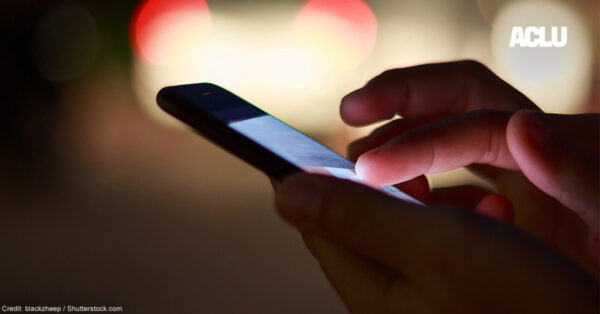ACLU Urges Ninth Circuit to Protect Privacy of Data on Cell Phones
SAN FRANCISCO — The American Civil Liberties Union, ACLU of Oregon, and several partner organizations filed a friend-of-the-court-brief today in the Ninth Circuit Court of Appeals in U.S. v. Hunt, a case which has major implications for our Fourth Amendment right to cell phone privacy.
The brief asserts that when a person abandons a cell phone as lost, the Constitution continues to protect the information that is stored on it, and therefore law enforcement should not be able to exploit the information gathered from any device without a warrant.
“The loss of a cell phone does not mean the loss of our rights to privacy,” said Kelly Simon, legal director of the ACLU of Oregon. “In this day and age, our cell phones hold some of the most private and intimate details of our daily lives. If law enforcement wants to search it, the Constitution is clear — they need to get a warrant.”
“Because the data on our cell phones can reveal countless private details of our lives, police should only be able to access that information by getting a warrant based on probable cause,” said Jennifer Granick, cybersecurity and surveillance counsel with the ACLU’s Speech, Privacy, and Technology Project. “People lose their phones all the time and replace them with new devices, but that doesn’t mean they have given up their expectation of privacy in all their personal data.”
This appeal comes after federal law enforcement searched an iPhone that Oregon police had found at a crime scene back in 2017, and used it to charge the owner with an unrelated crime over two years later. The defendant argues that the government’s 25-month delay between the seizure of the device and when they searched it invalidates the warrant under the Fourth Amendment and that the evidence on the phone should not be used against him. A lower court in 2022 denied Mr. Hunt’s motion, wrongly asserting that because the phone had been “abandoned,” he no longer had any expectation of privacy in the data, so no warrant was required to search the phone at all.
Everyone loses their phone from time to time, but we still care about the information on it, which also may be backed up or stored online. The brief explains that the Supreme Court’s 2014 decision in Riley v. California made clear that a person retains a protected privacy interest in the data on their phone even when police have been able to lawfully seize the phone itself.
The ACLU and ACLU of Oregon filed this brief along with the Electronic Frontier Foundation, Electronic Privacy Information Center, and National Association of Criminal Defense Lawyers. This brief is part of the ACLU’s long-running work protecting electronic data in the digital age. We argue that to keep apace with technological developments and adequately protect our privacy, the Fourth Amendment’s warrant requirement must be applied and interpreted robustly, which means seizures and searches of digital data must be cabined to probable cause, limited to specific categories of information relevant to the investigation, and closely overseen by a neutral magistrate.
Stay informed
Sign up to be the first to hear about how to take action.
By completing this form, I agree to receive occasional emails per the terms of the ACLU's privacy statement.
By completing this form, I agree to receive occasional emails per the terms of the ACLU's privacy statement.




